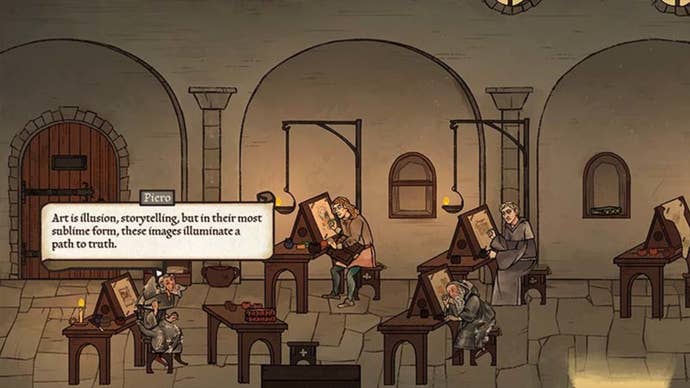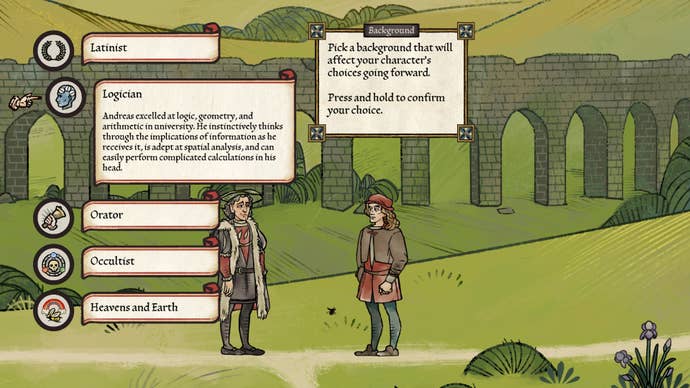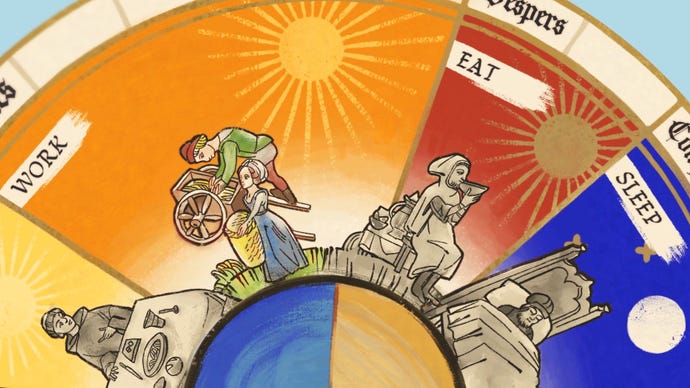If the best Xbox exclusive of this generation comes to Nintendo Switch, everyone should be excited
Pentiment isn’t just an important Xbox game, it’s an important game full stop.
Do you know why Obsidian’s latest obscure RPG is called Pentiment? The word (not a real one) comes from the term pentimento, which refers to a change an artist makes to their work as progress on the project continues. Pentimento, in turn, comes from the Italian pentirsi, which means to repent or change your mind. Given the game is about history, and what we do or do not believe in the recorded annals of our shared past, it’s a very fitting word to sit atop the whole thing.
And now, roughly 18 months after Xbox’s most peculiar exclusive first came to Series X/S, the history of Pentiment is very likely being altered again as its status as a Microsoft-only game hangs in the balance, with the hand of fate aching to ink the words ‘PlayStation’ and ‘Nintendohttps://www.vg247.com/platforms/switch’ beneath its title plate. How fitting. How poetic.
It shouldn’t work. A hand-painted, 2D detective thriller about a sequence of brutal murders set in the bucolic countryside of 16th-century Bavaria – no one is going to want to play that, are they? It’s the sort of game you’d read about on Eurogamer on a Sunday, or that your grandad would ask you about next time you head over for a last-minute Easter lunch. Against its Xbox-exclusive stablemates (Hi-Fi Rush, Halo, Forza, Starfield), it seems wholly out of place.
But its focus on food, font, and felonies weaves together in such an easy, self-assured way, it’s hard not to fall in love with Pentiment the second you pick it up. Maybe it's in the food – big plates of scran presented in lush detail, aimed at instantly immersing you in the life of a Bavarian living in the Holy Roman Empire – or maybe it's in the lush, dense setting of Tassing and its storied Kiersau Abbey. Maybe it’s the way the game treats font; as important and narratively significant as any character given a voice in a more modern-set game.
Or maybe it's in the peculiar intrigue of the story, inspired by Umberto Eco’s The Name of the Rose, and obsessed with capturing the texture of history in the same way. Whatever it is that makes Pentiment so captivating, it seems universal. Go and read any review or essay about the game and its impact – not even two years since launch – and you’ll see Obsidian’s thorns have hooked in more than a few cortices since November 2022.

It’s simply unlike any game I’ve ever played before. Yes, it’s an Obsidian RPG, and that means (like Pillars of Eternity, or The Outer Worlds, or even Alpha Protocol) it’s going to be thematically rich, a complete world, and smart about how it doles out those narrative beats. But the way it tells this story, in complete acts, with intermissions, and time-skips that’d make David ‘Cloud Atlas’ Mitchell blush… it's inspired.
Then there’s the tension between so many contrasting elements that colours the world further; the blossoming seeds of capitalism versus socialism, religion versus secularism, technology versus tradition, man versus nature. The game forces you to observe how they all intersect and intertwine, and – in great RPG fashion – it’s never as simple or one-sided as you’d think.
Making decisions and moral choices based on a fundamental understanding that nothing you can do is the right choice really reinforces the nature of being alive in protagonist Andreas Mahler’s era is an impossible task. Just as it is to live in any era, in any location, really, if you’re awake to the horrible implications of it all.

I think a lot of Pentiment’s success stems from the fact it was an unashamed passion project from Josh Sawyer (of Fallout New Vegas fame). Personally obsessed with themes of technological upheaval, social reform, and the inexorable nature of change – this was even clear in New Vegas, if you’re looking – Sawyer’s inky fingerprints are all over Pentiment. He studied early modern history in college, his maternal family tree has roots in Bavaria, and (as he puts it himself) “history contains everything cool that has ever happened”.
Pentiment is more than one man’s project, of course, but it’s clear to see how he led and directed his team to make something wholly representative of who he is, of what he stands for, of the through line between where he came from and where he is now. And now that it’s coming to other platforms – escaping from ‘the locked Xbox of history’, if you will – more people than ever have the chance to experience this incredible game.
Pentiment is one of the most important and effective games I’ve played… well, ever. I think it tells a story that can only be told in a video game, and I think it tells that story very well. If you care about the way this art form is maturing, and how it’s letting artists tell their specific stories in specific ways, I implore you: play Pentiment.
I imagine it’ll be an absolutely wonderful game-on-the-go via Nintendo Switch, too.










